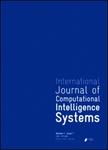版权所有:内蒙古大学图书馆 技术提供:维普资讯• 智图
内蒙古自治区呼和浩特市赛罕区大学西街235号 邮编: 010021

作者机构:Southwest Univ Sch Elect & Informat Engn 2 Tiansheng Rd Chongqing 400715 Peoples R China Chongqing Key Lab Nonlinear Circuits & Intelligen 2 Tiansheng Rd Chongqing 400715 Peoples R China
出 版 物:《INTERNATIONAL JOURNAL OF COMPUTATIONAL INTELLIGENCE SYSTEMS》 (国际计算智能系统杂志)
年 卷 期:2019年第12卷第2期
页 面:453-459页
核心收录:
学科分类:08[工学] 0812[工学-计算机科学与技术(可授工学、理学学位)]
基 金:National Science Foundation of China [61103132, 61872301] Fundamental Research Funds for the Central Universities of China [XDJK2013A020]
主 题:Intelligent biological alarm clock ECG Heart rate Heart rate variability Autonomic nervous system
摘 要:Nap is an effective way to reduce daily-level fatigue after several hours of work. However, no alarm clock, which intelligently manages the nap duration with good autonomic nervous recovery (ANR) from fatigue, has been reported in literature. In this work, an intelligent biological alarm clock algorithm was designed on the basis of electrocardiogram (ECG) and electroencephalogram (EEG) data acquisition and analysis. ECG data samples were collected from 31 subjects in 278 times of nap experiments and categorized into good, moderate, and poor ANR datasets according to the degree of sympathetic withdrawal and parasympathetic activation during the nap. In practice, the alarm clock automatically classified the new-coming ECG data as good, moderate, or poor ANR with a classifier trained by the abovementioned ANR datasets. A prototype system of the intelligent alarm clock algorithm was implemented and validated in real-scene naps. The prototype system detected falling asleep during the closed-eye naps with a true positive rate of 93.55% and a true negative rate of 100%. (c) 2019 The Authors. Published by Atlantis Press SARL.